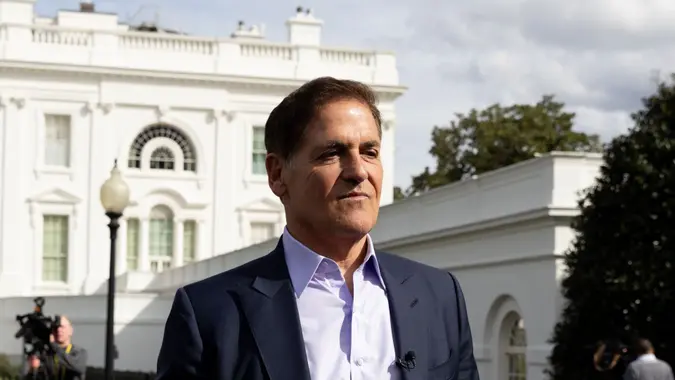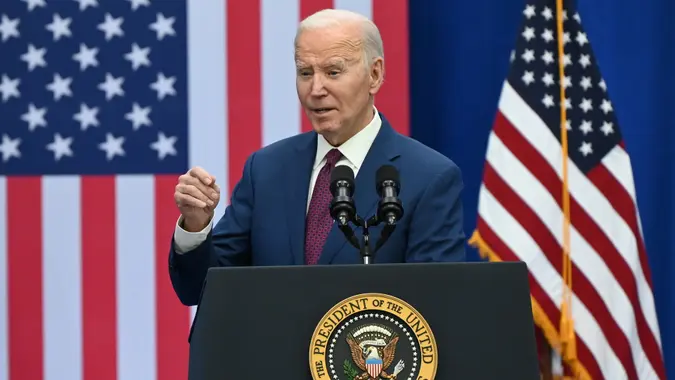9 Steps To Pay Off Debt on a Single Income

Commitment to Our Readers
GOBankingRates' editorial team is committed to bringing you unbiased reviews and information. We use data-driven methodologies to evaluate financial products and services - our reviews and ratings are not influenced by advertisers. You can read more about our editorial guidelines and our products and services review methodology.

20 Years
Helping You Live Richer

Reviewed
by Experts

Trusted by
Millions of Readers
With the cost of living going up steeply due to high inflation in the past few years, people living on a single income may wonder how they’re going to pay off debt and get ahead at the same time.
While it is indeed challenging to make strides, it is far from impossible, with strategic efforts and steadfast progress. Paying off debt is an especially wise move, because it allows you to free up all your income toward savings and investments that provide you with gains.
If bringing in more income is just not an option, look for ways to cut costs so that you can eke out more money to put toward your debt, and other creative solutions.
Prioritize High-Interest Debt
If you have multiple debt sources to pay down, your best bet is to pay down the ones with the highest interest rates first (for instance, credit cards), because you’re probably racking up a ton in interest. Pay as much as you can beyond the minimum monthly payment.
Consider Debt Consolidation
If you have no immediate plans to take out a loan or make a purchase that requires a high credit score, you can look into debt consolidation, which can also often negotiate a lower overall debt amount. Many lenders are willing to reduce fees, interest rates and overall debt if you commit to a consolidation of separate debts into their one umbrella.
Cancel Automatic Payments
A solid way to make sure you aren’t bleeding money away that you could be putting toward debt is to cancel anything that automatically debits from your account, other than bills. Whether these are apps you’ve forgotten you had, subscriptions or anything else, these can quickly eat into a limited income.
Then review them all to see which ones are worth keeping, and pay them manually in the months you have prioritized paying your debt, or re-subscribe when your debt is paid off.
Seek Out Free Subscriptions
If you had to cancel a bunch of subscriptions or apps because they were too expensive, remember that there might be some free alternatives to look into. For example, a monthly subscription to the audio book service Audible is around $14.95, but it’s free to check out audiobooks from most local libraries through the Libby app. Other apps like Spotify offer a free version with ads, which is worth the cost savings.
Temporarily Reduce Retirement Payments
If you’ve been contributing to a retirement account, and you’re not super close to retirement age, consider reducing the amount you’re putting away just until your debt is either paid off or paid down enough that your payments are not largely going to interest only. Of course, if you’re receiving matching funds from an employer, you probably don’t want to consider this option.
Take a Break From Eating Out
One of the most immediate places Americans have felt the sting of inflation over the past couple of years is in the cost of food.
Overall, food prices increased a stunning 9.9% in 2022 and 5.8% in 2023. Although the increases are getting smaller, they’ve still gone up again in 2024, according to the U.S. Department of Agriculture.
This is a great area to start limiting your expenditures, particularly if you’re dining out. Because dining out can be so much more expensive than buying your own food, it might be time to part ways with restaurants (even fast food restaurants) until you can get your debt handled.
Meal Plan
Additionally, food at home is also still on the higher-than-normal side, so to limit expenses in this arena, you want to look at ways to make more with less. One such way to do so is to meal plan — by laying out what you plan to eat each day every week, you can limit wasteful grocery shopping, and lean into bigger batches of food that can be frozen or spread across multiple meals.
Seek Gas Savings
Gas prices continue to remain relatively high around the country. The current national average for a gallon of regular gas is $3.51 and $4.31 for premium, according to AAA. In some states, it’s much higher, like California, where regular is $4.79 and premium is $5.17.
Try to limit driving when possible, double up on errands all in the same trip — better yet, try to hit stores that serve multiple needs so you don’t have to make as many stops. You might also see whether there’s a work carpool, if you have to commute, or whether your employer will reimburse any commuter costs.
Evaluate Every Purchase
Most important: Until debt is well handled, you should be scrupulous about evaluating every purchase you make for its necessity and cut of your income.
While living on a tight budget can feel constraining at first, when you begin to see the fruits of your labor, it will all be worth it.
More From GOBankingRates
 Written by
Written by  Edited by
Edited by 



























